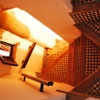Disclaimer
This entry contains information known to us from a variety of sources but may not include all the information currently available. Please be in touch if you notice any inadvertent mistakes in our presentation or have additional knowledge or sources to share. Thank you.
Archive
Tetouan Synagogue, Tetouan, Morocco
Tetouan Synagogue in Tetouan (تطوان), Morocco.
Introduction: Tetuan, a coastal city in Northern Morocco, has a long Jewish history. community. Since it had one of the most important Jewish populations in the Maghreb, Tetuan gained the nickname of “Little Jerusalem.”[1]
Description
The Synagogue:
Of the 16 synagogues which once were found in the Mellah (the Jewish neighborhood), only one synagogue remains, considering that
there are less than 50 Jews in the city. Nowadays, the Mellah’s inhabitants are mostly poor peasants. The well-kept synagogue and the gated Jewish cemetery contrast with the chaos of Tetuan's Muslim cemetery.
Once a year, the members of the Jewish-Moroccan Cultural Patrimony Foundation, based in Casablanca, come to celebrate Shabbat services and visit the tomb of Rabbi Isaac Ben Walid, for whom the synagogue is named. Otherwise, it is a shining and empty building that serves mostly as a reminder that Jews once lived there.[i]
Rabbi Isaac Ben Walid (1777–1870) was respected and venerated as a spiritual leader, whose “saintliness” and “wisdom” were remarkable.[ii] His book “Va-Yomer Yiẓḥak” (2 vols., Leghorn, 1855) serves as a formidable source of information about the history of the Jewish community of Tetuán.[iii]
The large number of Spanish and Portuguese Jews who settled in Morocco had an impact on the liturgy which was chanted in the Tetuan synagogue. The secular ballads, popular types of narrative songs, served to indicate tunes for hymns.[iv] One can point out that nowhere else were Sephardic Jews able to preserve their language and customs.[v]
Tetuan Jewish History:
Sephardic Jews who had been expulsed from Spain in 1492 settled in Tetuan. Due to favoritism from local Muslim rulers, Jews were the almost exclusively maritime trade merchants until the 20th century. While relationships between Jews and Muslim were overall “excellent”, Jews were occasionally persecuted.[vi]
One such persecution occurred from 1790 to 1792. A new king began a persecution Tetuan Jews, which then spread to the rest of Northern Morocco. This was based on the fact that, while he was an “outlaw”, who was fighting against his father,[vii] Jews had refused to lend him money. The “pogrom” which ensued was devastating.[viii] Several accounts detail these events. According to one of them, the king ordered the Jews to gather in a single place while the Muslims robbed them. The head of a Jew who had served the king’s father was placed in the city.[ix] A court historian described the events similarly, and added that “Many people profited from them [from the Jews].”[x]
Spain, whose colonization of Morocco progressed during the end of the 19th and the beginning of the 20th centuries and whose protectorate
officially lasted from 1912 to 1956, impacted the Jews of Tetuan. The Spanish interaction with the Jews can be described through Spanish literature. The Spanish, conscious of their country’s Jewish heritage, could communicate with Sephardic Jews from Tetuan, whose language they considered primitive and outdated. While a violently anti-Semitic Christian uses descriptions that support his anti-Jewishness, Manuel Ortega underlines the common cultural traits between the Sephardic Jews and the Spanish while Cesar Juarros y Ortega explores without prejudice the characteristics of the Jews and doubts of the benefits for the Moroccan population of the civilizing mission of the Spanish.[xi]
In the city of Tetuan, the number of Jewish residents generally ranged between 3,000 and 8,000 souls.[xii] Most Jews of the city were artisans, merchants, and peddlers.[xiii] Since 1948, the Tetuan Jewish population has declined. [xiv]
Sources
FOOTNOTES:
[1] Eric Calderwood, “Letter from Morocco: The
Living and the Dead,” The American Scholar 78, no. 4 (2009): 9.
[i] Calderwood, “Letterfrom Morocco: The Living and the Dead,” 10.
[ii] Marc Angel,“Bengualid (Ben Walīd), Isaac,” ed. Norman A. Stillman, Encyclopedia of Jewsin
the Islamic World, October 1, 2010,
http://0-referenceworks.brillonline.com.luna.wellesley.edu/entries/encyclopedia-of-jews-in-the-islamic-world/bengualid-ben-walid-isaac-SIM_0003890?s.num=0&s.f.s2_parent=s.f.book.encyclopedia-of-jews-in-the-islamic-world&s.q=Ben+Walid+isaac. Accessed on July 2nd 2017.
[iii] Corcos, Cohen, and Laskier, “Tetuán,” 655.
[iv] Hilary Pomeroy,“MUSLIM LANDS, CHRISTIAN HEROES, JEWISH VOICES: THE JUDEO-SPANISH BALLAD TRADITION OF MOROCCO,” European Judaism: A Journal for the New Europe 33, no. 1 (2000): 70–73.
[v] Corcos, Cohen, andLaskier, “Tetuán,” 655.
[vi] David Corcos, Haim J.Cohen, and Michael M. Laskier, “Tetuán,” ed. Michael Berenbaum and FredSkolnik, Encyclopaedia Judaica (Detroit: Macmillan Reference USA, 2007),655,http://libraries.state.ma.us/login?gwurl=http://go.galegroup.com/ps/i.do?p=GVRL&sw=w&u=mlin_m_wellcol&v=2.1&it=r&id=GALE%7CCX2587519761&asid=7e96b744ff9233a3f946070a5a062c71. Accessed on July 2nd 2017.
[vii] Ibid.
[viii] Norman A. Stillman,“TWO ACCOUNTS OF THE PERSECUTION OF THE JEWS OF TETOUAN IN 1790,” Michael: On the History of the Jews in the Diaspora 5 (1978): 131.
[ix] Ibid., 138.
[x] Ibid., 142.
[xi] Paloma Díaz‑Mas, “Musulmanes Y Judíos En La Literatura Africanista Española: Tres Testimonios de Principios Del Siglo XX,” Lusitania Sacra 27 (2013): 128–44.
[xii] Corcos, Cohen, andLaskier, “Tetuán,” 655.
[xiii] Aomar Boum, Memoriesof Absence (Redwood City: Stanford University Press, 2013), 1,https://ebookcentral.proquest.com/lib/well/reader.action?docID=1358595. Accessed on July 2nd 2017.
[xiv] Corcos, Cohen, and Laskier, “Tetuán,” 655.
BIBLIOGRAPHY:
Angel, Marc. “Bengualid (Ben Walīd), Isaac.” Edited by Norman A. Stillman. Encyclopedia of Jews in the Islamic World,October 1, 2010.http://0-referenceworks.brillonline.com.luna.wellesley.edu/entries/encyclopedia-of-jews-in-the-islamic-world/bengualid-ben-walid-isaac-SIM_0003890?s.num=0&s.f.s2_parent=s.f.book.encyclopedia-of-jews-in-the-islamic-world&s.q=Ben+Walid+isaac. Accessed on July 2nd 2017.
Boum, Aomar. Memoriesof Absence. Redwood City: Stanford University Press, 2013.https://ebookcentral.proquest.com/lib/well/reader.action?docID=1358595. Accessed on July 2nd 2017.
Calderwood, Eric. “Letter from Morocco: The Living and the Dead.” The American Scholar 78, no. 4 (2009): 7–11.
David Corcos, Haim J. Cohen, and Michael M. Laskier. “Tetuán.” Edited by Michael Berenbaumand Fred Skolnik. Encyclopaedia Judaica. Detroit: Macmillan ReferenceUSA,
2007.
http://libraries.state.ma.us/login?gwurl=http://go.galegroup.com/ps/i.do?p=GVRL&sw=w&u=mlin_m_wellcol&v=2.1&it=r&id=GALE%7CCX2587519761&asid=7e96b744ff9233a3f946070a5a062c71. Accessed on July 2nd 2017.
Díaz‑Mas, Paloma. “Musulmanes Y Judíos En La Literatura Africanista Española: Tres Testimonios de Principios Del SigloXX.” Lusitania Sacra 27 (2013): 127–52.
Pomeroy, Hilary.“MUSLIM LANDS, CHRISTIAN HEROES, JEWISH VOICES: THE JUDEO-SPANISHBALLADTRADITION OF MOROCCO.” European Judaism: A Journal for the New Europe33, no. 1 (2000): 70–83.
Stillman, Norman A. “TWO ACCOUNTS OF THE PERSECUTION OF THE JEWS OF TETOUAN IN 1790.” Michael:On the History of the Jews in the Diaspora 5 (1978): 130–42.


